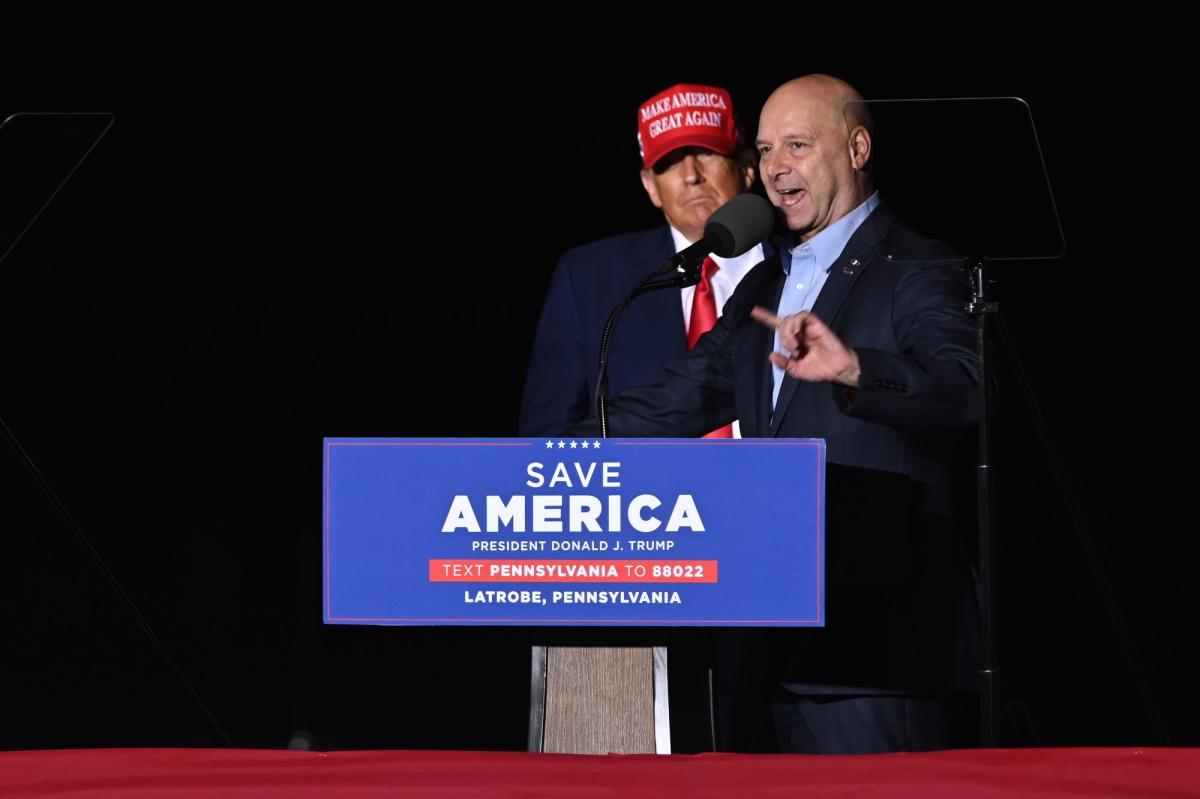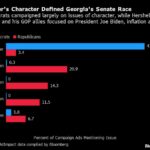
(Bloomberg) — The “Big Lie” lost where it mattered the most.
Most Read from Bloomberg
Voters resoundingly rejected election deniers on Tuesday for positions that would oversee the 2024 presidential race in the crucial battlegrounds of Michigan, Pennsylvania and Wisconsin.
And in Georgia, they re-elected Republican Governor Brian Kemp and Secretary of State Brad Raffensperger, who stood up to Donald Trump’s demands to overturn his 2020 loss in the state.
That leaves Arizona and Nevada, two hot spots of election denial this year, where key statewide candidates have boasted of their belief that Trump won the 2020 election and would change state laws to make it harder to vote and ignore voters’ will.
Kari Lake’s campaign for Arizona governor and Jim Marchant’s campaign for Nevada secretary of state remained too close to call, while Mark Finchem was trailing in his campaign for Arizona secretary of state.
Elsewhere in the US, though, election denial was a losing message.
In Michigan, 59% of voters backed a ballot measure that was essentially a line-by-line rebuke of Trump’s attacks on elections: It added a nine-day early voting period, required the state to fund ballot drop boxes, made it harder to dispute certification of results, and allowed local elections officials to accept charitable donations like those given out by Meta Platforms Inc. CEO Mark Zuckerberg in 2020.
Election denial made the most progress in races for US House and Senate, which may soon pass a bipartisan bill in the upcoming lame-duck session that would make it harder for members of Congress to object to state’s electors as they did in 2021.
But it proved costly for some candidates whose words and actions made election denial a central issue. Those like Doug Mastriano in Pennsylvania who campaigned firmly on the issue, promising to take steps such as throwing out every voter registration in the state, went down in defeat. Those who agreed to Trump’s demands to say the 2020 election was rigged but campaigned on issues like inflation, succeeded.
Voters showed the door to any candidates who participated in the Jan. 6 insurrection, even as the riot factored low in lists of key campaign issues. One exception was winning Wisconsin House candidate Derrick Van Orden, who wrote a contrite op-ed that he left the insurrection when it “became clear that a protest had become a mob.” Others in competitive House races, like Allan Fung in Rhode Island, Bo Hines in North Carolina, and Yesli Vega in Virginia, lost after facing attack ads featuring Jan. 6 footage.
Several candidates who had followed Trump’s lead and declined to say whether they would concede in the run-up to Election Day ultimately bowed to tradition after losing, including Michigan gubernatorial candidate Tudor Dixon, Wisconsin gubernatorial candidate Tim Michels and New Hampshire Senate candidate Don Bolduc.
The most dramatic change in tone came in Pennsylvania. Mastriano, who led Trump’s efforts to overturn his loss in the state and was outside the Capitol during the Jan. 6 insurrection, did not raise the specter of fraud. He said he would wait for all the votes to be counted, but if he was still defeated then, he would accept it.
“It is a constitutional republic that we have, and the people get the last word,” he said. “And what the people of Pennsylvania say, we’ll of course respect that.”
In the wake of unexpected Democratic success in some key races on Tuesday, online chatter on right-wing sites was divided between those who said it was further proof that elections are rigged against them and others who blamed Trump ortalked about poor candidate quality.
And while several instances of armed and masked individuals standing watch over ballot drop boxes during the early voting period in Arizona led to voter-intimidation lawsuits, there were few reports of confrontations at polling places on Election Day or unruly protests outside ballot counting centers after the election.
Election denial proved a popular message in Republican primaries, and Trump required all candidates who won his endorsement to say the 2020 election was rigged, according to a person familiar with his process. In all, 225 candidates for governor, attorney general, secretary of state or Congress either outright denied Biden’s win or cast doubt on its legitimacy.
Outside groups allied with Democrats spent more than $46 million criticizing secretary of state candidates who were election deniers, running ads featuring footage from the Jan. 6 attack on the Capitol and highlighting extreme remarks they had made on QAnon conspiracy theories or abortion.
Polls showed the message broke through, even as voters were concerned about inflation and high gas prices and generally unhappy with the direction of the country under President Joe Biden. In an exit poll from VoteCast of 94,000 voters nationally, 44% said the future of democracy was their primary consideration when casting their ballot, putting it just below inflation and the economy.
The atmosphere in the days before the election was heated. A man broke into Speaker Nancy Pelosi’s home and attacked her husband with a hammer, raising concerns about the potential for random political violence. In a speech, Biden warned that democracy itself was “under attack,” while former President Barack Obama said at a Phoenix rally if election deniers were to win there, “democracy as we know it may not survive in Arizona.”
Looming over the election was Trump’s election-eve announcement that he would declare his candidacy for the 2024 race next week.
And while his acolytes were going down in defeat, the former president spent election night on social media, posting conspiracy theories about voting machines in Arizona, Michigan and Pennsylvania and criticizing failed Republican Senate candidates in Colorado and New Hampshire for not toeing the line on his claims of widespread fraud, including a defeated New Hampshire Senate candidate.
“Don Bolduc was a very nice guy, but he lost tonight when he disavowed, after his big primary win, his longstanding stance on Election Fraud in the 2020 Presidential Primary,” Trump wrote, misstating his own claims.
Most Read from Bloomberg Businessweek
©2022 Bloomberg L.P.




